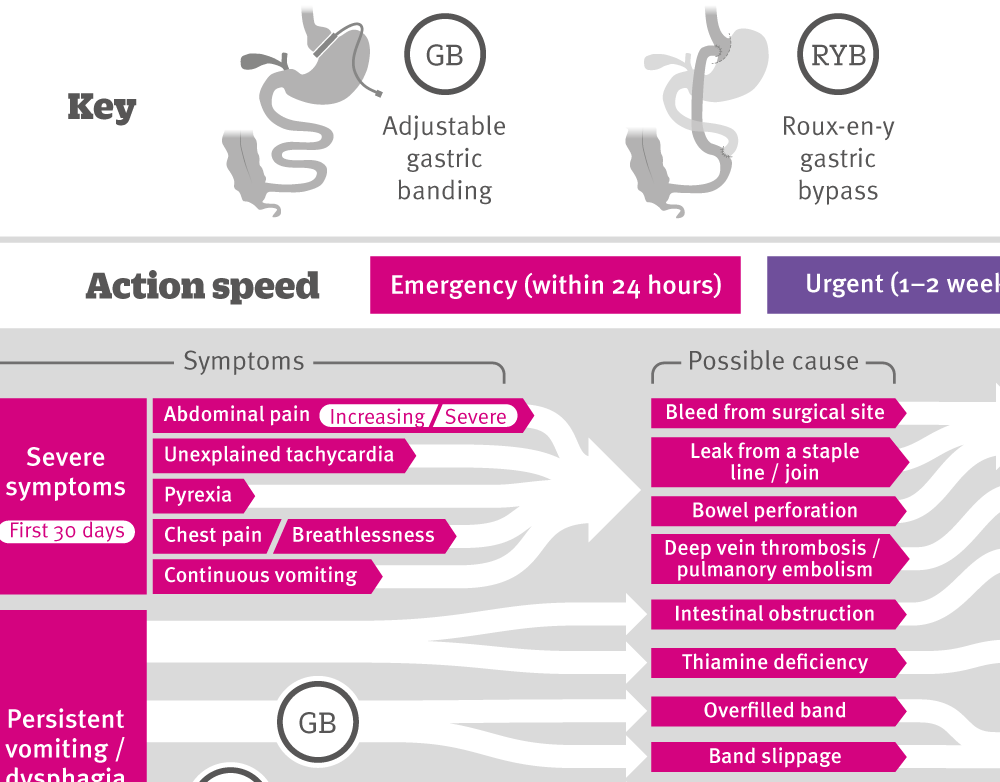
Doctors are less comfortable managing an obese patient after bariatric surgery. Bariatric complications, including abdominal pain, nausea and vomiting, dysphagia, gastrointestinal hemorrhage, and weight regain, all of which may provoke an endoscopic

Patients need to be aware of complications that can occur after bariatric surgery.
Complication of bariatric surgery. Below the major complications of bariatric surgery are outlined based on the different procedures individually. The leak was the commonest complication (12%). A procedure which is on the rise owing to the increased prevalence of obesity.
Doctors are less comfortable managing an obese patient after bariatric surgery. Predicting risk for serious complications with bariatric surgery: 51, 52 the incidence of developing gallstones after bariatric surgery ranges from 22% to 71%.
If these symptoms are noted notify the surgeon immediately. Although the immediate risks of. A common late postoperative gi complication noted to occur with rapid weight loss from bariatric surgery is gallstone formation.
This stage can be hard because your diet will be pureed food, protein shakes, and water. This review describes the most commonly seen complications of bariatric surgery including anastomotic leak, thromboembolism, stricture formation, internal hernia, ulcer formation, cholelithiasis, hemorrhage, nutritional and metabolic derangements. If an anastomotic leak occurs, it usually happens within the first few days of surgery and rarely after 2 weeks.
The complication rate is 10 percent, with reoperation not uncommon due to. While bariatric surgery can result in lasting weight loss of 50 percent of body weight, the complications exceed those of all other abdominal surgery, dr. 6, 52, 53 in assessing the efficacy of ursodeoxycholic acid in reducing gallstone formation in the setting of gastric banding and rnygbp, studies have.
Results from the michigan bariatric surgery. Because mortality after bariatric surgery is so rare, we used any complication, serious complications, and reoperation as our main outcome variables. Bariatric surgery can have an effect on different bodily functions, and this does include bowel function.
• the leading cause of preventable death following bariatric surgery • signs and symptoms • unexplained shortness of breath • pain with deep breathing • hemoptysis • chest pain • tachypnea • tachycardia. Within the first two weeks of your gastric sleeve, you will still be adjusting to your new life. Complications of gastric bypass surgery:
The specific feature in the obese patient is that the classical signs of peritoneal. To quote the authors of a paper in which people were followed for 7.7 years on average, “bariatric surgery which is accompanied by substantial biochemical, hormonal, and mechanical changes, is associated with increased risk of fracture.” An anastomotic leak is the most dreaded complication of any bariatric procedure because it increases overall morbidity to 61% and mortality to 15%.1 2 failures of anastomotic integrity prolong
In this article we describe an unusual complication of bariatric surgery. The procedure involves the creation of a small gastric pouch and an anastomosis to a limb of jejunum. Patients need to be aware of complications that can occur after bariatric surgery.
Symptoms include tachycardia, worsening abdominal pain, leukocytosis, fever, and oliguria. Finks jf, kole kl, yenumula pr, et al. The most common complication after surgery is peritonitis due to anastomotic fistula formation.
You might feel moody or depressed. These changes are related to and dependent upon which type of bariatric operation has been performed. Can often be avoided with the right behavior and choices.
The mortality rate is 0.4 percent, with pulmonary embolisms responsible for the majority of deaths. The copyright in this work belongs to radcliffe medical media. So it’s undeniably clear that bariatric surgeries trigger ongoing, excessive bone loss.
Sity, is the standard surgical treatment method for bariatric surgery (bs). Its severity may vary from asymptomatic elevations of creatine kinase to death. Bariatric complications, including abdominal pain, nausea and vomiting, dysphagia, gastrointestinal hemorrhage, and weight regain, all of which may provoke an endoscopic
Sleeve gastrectomy was the most common bariatric surgery. Bariatric surgery is associated with significant weight loss and improvement in diabetes, hypertension, and obstructive sleep apnea. The epidemic in obesity has led to an increase in number of so called bariatric procedures.
We present a case of developed acute polyneuropathy after bs. Complications after bariatric surgery are not uncommon occurrences that influence the choice of operations both by patients and by surgeons. Despite improvement in the performance of bariatric surgical procedures, complications are not uncommon.